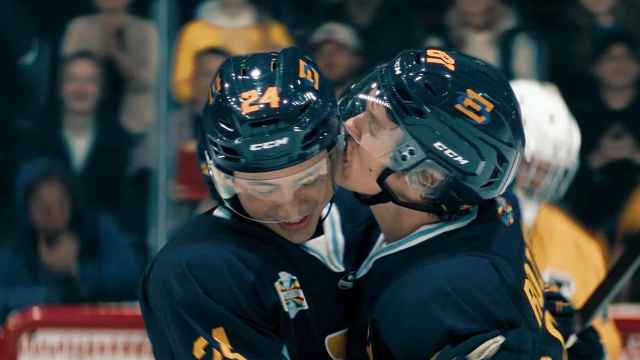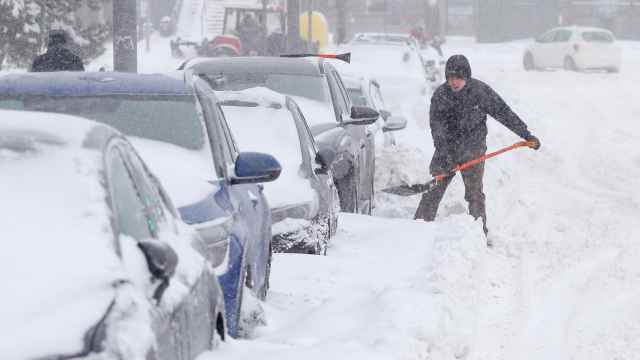The numbers are published and available for anyone to peruse. As are the reports of alleged falsifications that may have affected those numbers significantly.
But what we are interested in today is not where we have been. Far more interesting, and surely more important, is: Where are we headed?
Throughout election day and in the early hours of the proverbial "morning after," I followed what many in the artistic community were saying.
"The dramaturgy of today's event is not of interest," director and playwright Mikhail Ugarov said on the Dozhd television channel in the wee hours of Monday morning. "What interests me is what happens next."
Ugarov declared that a "battle" is in the waiting, a battle not only with those who presently hold power. "It will also be a battle with the left, because they were incapable of putting forth serious candidates," he stated.
Also speaking on Dozhd, film director Pavel Lungin took a different tack, suggesting it may take "20 or 25 years before anything changes."
"The nature of power in Russia," Lungin explained, has not changed since the times of Ivan the Terrible. "People change, life changes, stores change, but the nature of power does not."
Facebook, usually a hotbed of passionate claims and exhortations, went quiet over the course of the day Sunday. Posts showing the huge numbers of buses and military personnel carriers that blocked so many Moscow streets were prevalent, as were references to voting irregularities that people witnessed personally or heard about through various sources. Most of all, those who are accustomed to using the popular social networking site to share their political views seemed to be drawing a collective breath.
That changed by late evening, when the first official results showed Putin would easily be declared victorious.
Actor Alexei Devotchenko was one of many who railed at the "spectacle" that Russia's Channel One was making of Putin's victory rally on Manezh Square.
But anger shared space with dejection and introspection.
Yevgenia Berkovich, a young theater director, suggested that the 64% of the vote attributed to Putin could not have been pulled out of the air. "Let's quit pretending that in truth the only people who voted for Putin were two insane asylums and Kristina Potupchik," she wrote, referring to the press secretary of the Federal Youth Agency, which oversees patriotic youth organization Nashi. "Something tells me that these were relatively fair elections and that is far, far more frightening than the alternative."
This was countered by playwright Yelena Gremina, who produced figures from two polling places and suggested that the real breakdown of votes in Moscow was something along the line of Putin at 40 percent, Mikhail Prokhorov at 30 percent and Communist Gennady Zyuganov at 20 percent.
"This differs from the official picture, and it is the real one. It would be interesting to know the real figures for all of Russia," Gremina added.
St. Petersburg director and playwright Dmitry Yegorov expressed his feelings briefly on Facebook Monday morning: "It's sad and disgusting. There is no future."
Director Anna Potapova made two posts in quick succession on Sunday evening. Around 11 p.m. she wrote, "It looks to me like I have lost my sense of humor once and for all. RIP." But within minutes she posted a photo depicting the statue of poet Alexander Pushkin that stands on Pushkin Square against the backdrop of the Russian flag. On it are printed the words, "I Choose Pushkin."
Indeed, two hours after Potapova's post, at around 1 a.m. on Monday, writer Lev Rubinshtein signed off for the night with a reference to an opposition rally scheduled for Monday night on Pushkin Square: "All right, that's probably enough for today. Morning is wiser than night. And Pushkin is wiser still. Tomorrow evening we will be with him. There must be many of us."
In an interview published online Monday, American director Graham Schmidt asked playwright Maksym Kurochkin if his future plays will reflect the new political climate.
"Yes, that is inescapable," Kurochkin responded. "But I would of course like to talk about it in a new way. Right now, I am set against myself. A sophisticated form is often ill-suited to 'political' plays. In order to achieve results, one must not fear elementary, time-tested devices. I understand this with my mind. But I can't help it — I show off where I need to be intelligible and clear. Therefore, the time for 'political' plays — it's not my time. But still, one has to try: Injustice develops the mind. One needs to blow off steam, somehow. Even if in little spurts."
A Message from The Moscow Times:
Dear readers,
We are facing unprecedented challenges. Russia's Prosecutor General's Office has designated The Moscow Times as an "undesirable" organization, criminalizing our work and putting our staff at risk of prosecution. This follows our earlier unjust labeling as a "foreign agent."
These actions are direct attempts to silence independent journalism in Russia. The authorities claim our work "discredits the decisions of the Russian leadership." We see things differently: we strive to provide accurate, unbiased reporting on Russia.
We, the journalists of The Moscow Times, refuse to be silenced. But to continue our work, we need your help.
Your support, no matter how small, makes a world of difference. If you can, please support us monthly starting from just $2. It's quick to set up, and every contribution makes a significant impact.
By supporting The Moscow Times, you're defending open, independent journalism in the face of repression. Thank you for standing with us.
Remind me later.






